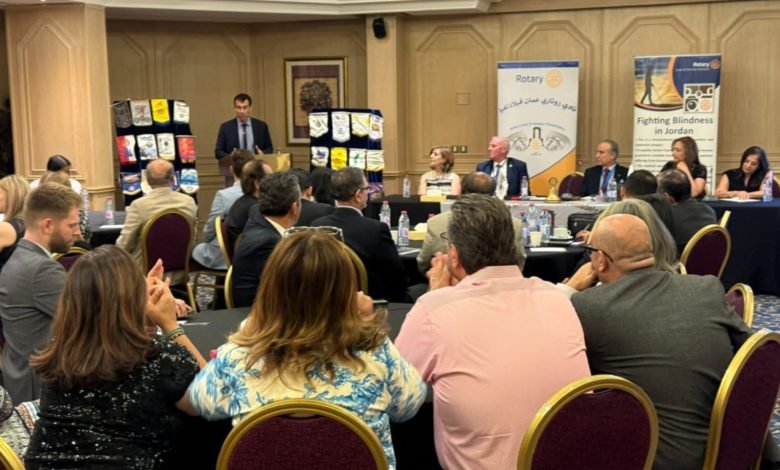
Jordan Daily – The European Union’s ambassador to Jordan, Pierre-Christophe Chatzisavas, said Europe is exerting growing pressure on Israel over Gaza, backing Jordan’s stability, and moving irreversibly toward recognizing a Palestinian state.
In an event hosted by Rotary Club of Amman Philadelphia last Wednesday, Chatzisavas called 2025 “one of the most difficult years” in modern diplomacy, citing the breakdown of international norms and deepening instability.
“We have gone from bad to worse,” he said. “The principles of international law have been violated across regions. And yet, these shared challenges have brought the European Union even closer together.”
Despite global setbacks, Chatzisavas pointed to diplomatic progress in Gaza, revealing that EU pressure had led to a key humanitarian agreement with Israel. He called it “a story of leverage that worked.”
Following a June 23 meeting of EU foreign ministers, the European External Action Service (EEAS) was tasked with outlining pressure tools in response to Israel’s violations of international humanitarian law. Chatzisavas said the result was “effective political pressure.”
“We used our diplomatic channels to push for humanitarian access to Gaza-and it worked. Israel accepted our terms,” he said.
The agreement, approved by Israel’s cabinet on July 9, includes expanded aid access, fuel shipments, infrastructure repairs, and the reactivation of humanitarian corridors through Egypt and Jordan. It also provides access for aid workers and UN monitors. EU officials will review Israeli compliance biweekly.
The envoy said the agreement “created political space,” enabling the first Israeli-Palestinian foreign minister meeting since 2022, with participation from Arab states, including Jordan.
Chatzisavas also signaled a shift on Palestine, saying France’s move toward recognition is “a train that has left the station.” He added: “France will do it. There is no going back. The real question now is: how many others will follow?”
A key test will come at the UN conference on July 28–29. While EU-wide suspension of the EU-Israel Association Agreement remains unlikely, the ambassador listed other options: trade restrictions on settlement goods, unilateral steps by member states, and use of trade deals as leverage.
“We’ve already sanctioned extremist settlers. But clearly, we haven’t done enough,” he said.

Turning to Jordan, Chatzisavas praised the kingdom as “a reliable and essential partner.” EU aid to Jordan currently totals €500 million annually, two-thirds of it in grants. A new €3 billion partnership package blends grants and loans across sectors.
The EU is investing in public transport (€20 million), defense cooperation (including radar and air defense systems), water security (backing Jordan’s National Water Conveyor Project), and education. Over 6,000 higher education scholarships have been awarded to Syrian refugees and vulnerable Jordanians.
“Education remains a top priority,” Chatzisavas said, linking it to economic and regional stability.
Looking ahead, the ambassador previewed the 2026 EU-Jordan Investment Conference, aiming to boost foreign investment and job creation. He also highlighted the India- Middle East-Europe Economic Corridor (IMEC) as a long-term strategic goal contingent on political progress.
“The labor market remains the biggest challenge for Jordan’s youth. Investment—real, sustainable investment—is the only path forward,” he said.
Chatzisavas concluded with a call for principled diplomacy. “Whether in Gaza, in the halls of the UN, or here in Amman, our goal is the same: to stand by international law, to support our partners, and to make diplomacy work.”

